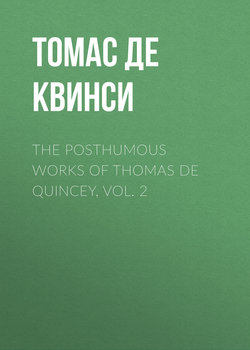The Posthumous Works of Thomas De Quincey, Vol. 2

Реклама. ООО «ЛитРес», ИНН: 7719571260.
Оглавление
Томас Де Квинси. The Posthumous Works of Thomas De Quincey, Vol. 2
INTRODUCTION
I. CONVERSATION AND S. T. COLERIDGE
EDITOR'S NOTE TO THIS ESSAY
II. MR. FINLAY'S HISTORY OF GREECE
FURTHER NOTES FOR ARTICLE ON MR. FINLAY'S HISTORY
III. THE ASSASSINATION OF CÆSAR
IV. CICERO (SUPPLEMENTARY TO PUBLISHED ESSAY)
ADDITIONAL NOTES FOR CICERO
V. MEMORIAL CHRONOLOGY
VI. CHRYSOMANIA; OR, THE GOLD-FRENZY IN ITS PRESENT STAGE
VII. DEFENCE OF THE ENGLISH PEERAGE
VIII. THE ANTI-PAPAL MOVEMENT
EDITOR'S NOTE
IX. THEORY AND PRACTICE:
X. POPE AND DIDACTIC POETRY
XI. SHAKSPEARE AND WORDSWORTH
XII. CRITICISM ON SOME OF COLERIDGE'S CRITICISMS OF WORDSWORTH
XIII. WORDSWORTH AND SOUTHEY: AFFINITIES AND DIFFERENCES
XIV. PRONUNCIATION
XV. THE JEWISH SCRIPTURES COULD HAVE BEEN WRITTEN IN NO MODERN ERA
XVI. DISPERSION OF THE JEWS, AND JOSEPHUS'S ENMITY TO CHRISTIANITY
XVII. CHRISTIANITY AS THE RESULT OF PRE-ESTABLISHED HARMONY
XVIII. THE MESSIANIC IDEA ROMANIZED
XIX. CONTRAST OF GREEK AND PERSIAN FEELING IN CERTAIN ASPECTS
XX. OMITTED PASSAGES AND VARIED READINGS
Отрывок из книги
What are the great leading vices of conversation as generally managed?—vices that are banished from the best society by the legislation of manners, not by any intellectual legislation, but in other forms of society, and exactly as it approaches to the character of vulgarism, disturbing all approaches to elegance in conversation, and disorganizing it as a thing capable of unity or of progress? These vices are, first, disputation; secondly, garrulity; thirdly, the spirit of interruption.
I. I lay it down as a rule, but still reserving their peculiar rights and exceptions to young Scotchmen for whom daily disputing is a sort of daily bread, that the man who disputes is a monster, and that he ought to be expelled from civilized society. Or could not a compromise be effected for disputatious people, by allowing a private disputing room in all hotels, as they have private rooms for smoking? I have heard of two Englishmen, gentlemanly persons, but having a constitutional furor for boxing, who quieted their fighting instincts in this way. It was not glory which they desired, but mutual punishment, given and taken with a hearty goodwill. Yet, as their feelings of refinement revolted from making themselves into a spectacle of partisanship for the public to bet on, they retired into a ball-room, and locked the doors, so that nothing could transpire of the campaigns within except from the desperate rallies and floorings which were heard, or from the bloody faces which were seen on their issuing. A limited admission, it was fancied, might have been allowed to select friends; but the courteous refusal of both parties was always 'No; the pounding was strictly confidential.' Now, pray, gentlemen disputers, could you not make your pounding 'strictly confidential'? My chief reasons for doing so I will mention:
.....
A second thing to be said in palliation of such plagiarisms, real or fancied, intentional or not intentional, is this—that at least Coleridge never insulted or derided those upon whose rights he is supposed to have meditated an aggression.
Coleridge has now been dead for more than fifteen years,9 and he lived through a painful life of sixty-three years; seventy-eight years it is since he first drew that troubled air of earth, from which with such bitter loathing he rose as a phœnix might be supposed to rise, that, in retribution of some treason to his immortal race, had been compelled for a secular period to banquet on carrion with ghouls, or on the spoils of vivisection with vampires. Not with less horror of retrospect than such a phœnix did Coleridge, when ready to wing his flight from earth, survey the chambers of suffering through which he had trod his way from childhood to gray hairs. Perhaps amongst all the populous nations of the grave not one was ever laid there, through whose bones so mighty a thrill of shuddering anguish would creep, if by an audible whisper the sound of earth and the memories of earth could reach his coffin. Yet why? Was he not himself a child of earth? Yes, and by too strong a link: that it was which shattered him. For also he was a child of Paradise, and in the struggle between two natures he could not support himself erect. That dreadful conflict it was which supplanted his footing. Had he been gross, fleshly, sensual, being so framed for voluptuous enjoyment, he would have sunk away silently (as millions sink) through carnal wrecks into carnal ruin. He would have been mentioned oftentimes with a sigh of regret as that youthful author who had enriched the literature of his country with two exquisite poems, 'Love' and the 'Ancient Mariner,' but who for some unknown reason had not fulfilled his apparent mission on earth. As it was, being most genial and by his physical impulses most luxurious; yet, on the other hand, by fiery aspirations of intellect and of spiritual heart being coerced as if through torments of magical spells into rising heavenwards for ever, into eternal commerce with the grander regions of his own nature, he found this strife too much for his daily peace, too imperfect was the ally which he found in his will; treachery there was in his own nature, and almost by a necessity he yielded to the dark temptations of opium. That 'graspless hand,' from which, as already in one of his early poems (November, 1794) he had complained—
.....